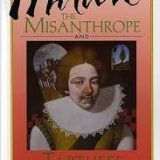The Misanthrope – Jean Baptiste Molière – 1666
Reviewed by: Lale
The Misanthrope starts with an amusing clash of two friends which reveals, with no room for mistake, the personality and philosophy of Alceste, the misanthrope:
 Philinte:
Philinte:
Why, what have I done, Alceste? Is this quite just?
Alceste:
My God, you ought to die of self-disgust.
I call your conduct inexcusable, Sir,
And every man of honour will concur.
I see you almost hug a man to death,
Exclaim for joy until you’re out of breath,
And supplement these loving demonstrations
With endless offers, vows, and protestations;
Then when I ask you ‘Who was that?’, I find
That you can barely bring his name to mind!
Once the man’s back is turned, you cease to love him,
And speak with absolute indifference of him!
As you can see, Richard Wilbur’s translation is absolutely delightful. Although, I have to admit, since there is so much music in the lines, / and if you read pages of these rhymes, / you might find yourself reading for the melody’s sake / and losing the meaning, then you have to take a break.
Alceste is a man with strict principles, who does not give in to the pressures of social manners, friends, love or even law suits. He has to be brutally honest, at all times, no exception. He is “inclined to be unfashionably sincere.” His encounter with Oronte, an aspiring poet, is brilliant. Here is the excerpt I love the most:
Oronte:
…
In short, I am your servant. And now, dear friend,
Since you have such fine judgement, I intend
To please you, if I can, with a small sonnet
I wrote not long ago. Please comment on it,
And tell me whether I ought to publish it.
…
Alceste:
…
Sir, these are delicate matters; we all desire
To be told that we’ve the true poetic fire.
But once, to one whose name I shall not mention,
I said, regarding some verse of his invention,
That gentlemen should rigorously control
That itch to write which often afflicts the soul;
That one should curb the heady inclination
To publicize one’s little avocation;
And that in showing off one’s works of art
One often plays a very clownish part.
…
You’re under no necessity to compose;
Why you should wish to publish, heaven knows.
There’s no excuse for printing tedious rot
Unless one writes for bread, as you do not.
Resist temptation, then, I beg of you;
Conceal your pastimes from the public view;
Of course at the end, Alceste, the misanthrope, the man who is so unfashionably sincere, finds no other choice than to “flee this bitter world where vice is king, and seek some spot unpeopled and apart, where he will be free to have an honest heart”.















